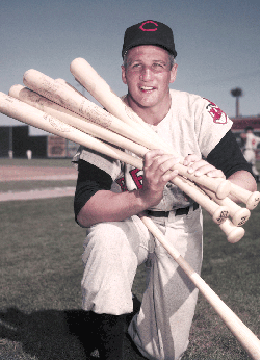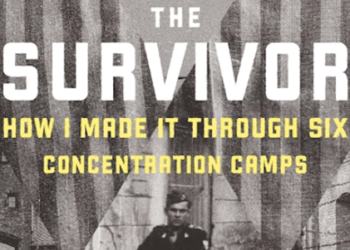Cleveland Indians hitter Al Rosen makes a memorable appearance in Jews and Baseball: An American Love Story, an entertaining and unexpectedly thoughtful documentary
By MICHAEL FOX
On his way to becoming a perennial all-star in the mid-1950s, Cleveland Indians clean-up hitter Al Rosen received more than his share of barbs from opposing dugouts and the stands.
All these years later, the slugging Jewish third baseman recalls how he distinguished casual insults from malicious slurs.
“There’s a line where you can accept it because you know it’s not right but it’s not that offensive,” he said, diplomatically yet forcefully. “It’s the moment that it becomes offensive that you make a decision, and I’m sure there’s not a lot of forethought to this, but the decision is, ‘I’m going to stop this right now because if I don’t it’s going to go on and on and on.’”
Minneapolis Jewish Film Festival
Rosen, who turned 86 last month, makes a memorable appearance in Jews and Baseball: An American Love Story, Peter Miller’s entertaining and unexpectedly thoughtful documentary about the relationship between the national pastime, an immigrant population and their assimilated sons and daughters.
Jews and Baseball, which boasts a first-rate narration written by New York Times sportswriter Ira Berkow and read by Dustin Hoffman, and an ultra-rare interview with Sandy Koufax, screens as part of the Sabes Foundation Minneapolis Jewish Film Festival on March 30 at Theatres at Mall of America.
 Al Rosen is one of the stellar Jewish players featured in Jews and Baseball: An American Love Story. The documentary will be screened on March 30 as part of the Sabes Foundation Minneapolis Jewish Film Festival. (Photo: Courtesy of Seventh Art Releasing)
Al Rosen is one of the stellar Jewish players featured in Jews and Baseball: An American Love Story. The documentary will be screened on March 30 as part of the Sabes Foundation Minneapolis Jewish Film Festival. (Photo: Courtesy of Seventh Art Releasing)
(The film also features legendary Hall of Fame pitcher Koufax’s memories of the 1965 World Series, when the Los Angeles Dodgers faced the Minnesota Twins. Koufax chose to sit out the first game of the series to observe Yom Kippur; the Dodgers lost the game but eventually won the series.)
Rosen wasn’t raised with any formal training in Judaism, he said in an interview during the San Francisco Jewish Film Festival last summer, but he knew who he was. Actually, when he was growing up in the 1930s in a lower-middle-class neighborhood in Miami (where Little Havana is today) with no other Jews, there was always some kid to remind him.
“You’re picked on, you’re made fun of, you’re the butt of jokes, and unless you assert yourself soon and often you soon become cast aside,” Rosen said. “Well, I was never one to be cast aside.”
That’s not false bravado. The wiry Rosen still gives off the vibe of a man who won’t be pushed around. As he describes his adolescence, it’s easy to see why he wasn’t hesitant to use his fists to silence an anti-Semite in the minors or even after he reached the big leagues in 1947.
“Some kids are bigger than others, and they want to be bullies,” he noted. “And sometimes you have to know that you’re not going to win, but you have to take on the bully. That’s what happened more than once in my growing up in the southwest section of Miami.”
Rosen came within one hit of the elusive batting Triple Crown in 1953, and garnered the American League MVP award in a unanimous vote. But bothered by injuries and livid at the way Indians general manager (and Detroit Tigers legend) Hank Greenberg treated him — cutting his salary after the 1954 season and trading him to Boston after the ’56 campaign — Rosen retired at the age of 32 rather than start over in a new city.
Jews and Baseball suggests that Greenberg was tougher on Rosen, a fellow member of the tribe, than he was on any other Cleveland player. When I brought up his predecessor’s name, Rosen only says, “Greenberg and I were not friendly.”
He does credit Greenberg with being the first great Jewish ballplayer, and for inspiring other Jews to enter the game. But Rosen attributes the decline in overt anti-Semitism to the establishment of the State of Israel in 1948.
“Once the Jews began to fight, people realized the Jews were not just shopkeepers, nor were they just accountants or doctors or lawyers or musicians,” Rosen declared. “I think there was a metamorphosis that took place. All of us who were in [public] life benefited from that.”
Speaking of fighting, Rosen was longtime teammates with Larry Doby, who broke the color barrier in the American League two months before Rosen was called up.
“I don’t know that Doby was of any help to me as a Jew or I was any help to Doby as a black man,” Rosen said, before recounting an incident in Texas involving a cabbie who refused to drive the black player.
“I got out of the cab and told him he was going to take us and he said, ‘No, I’m not,’ and I grabbed him and punched him,” Rosen said. “I think that sort of resolved Doby’s feelings about how I felt about him.”
Rosen returned to baseball in the late 1970s as president of the Yankees after his old friend, George Steinbrenner, bought the team. Rosen was also a successful GM with the Houston Astros and San Francisco Giants, and he continues to follow the game and hold strong, well-considered opinions.
If one word could be used to describe Al Rosen, it would be character.
“I wore my feelings on my sleeves,” he confided. “I always felt that I want to conduct myself that, if I were walking down the street, one Jew could look at another Jew and say, ‘He’s a mensch.’ That was sort of ingrained in me.”
***
As part of the Sabes Foundation Minneapolis Jewish Film Festival, the Jewish Historical Society of the Upper Midwest (JHSUM) and the St. Paul JCC will present Jews and Baseball: An American Love Story 7 p.m. Wednesday, March 30 at the Theatres at Mall of America, 401 South Ave., Bloomington.
Tickets are $7 for JHSUM, St. Paul JCC and Sabes JCC members, and $9 for the general public; visit: www.sabesjcc.org, call 952-381-3499 or e-mail: tickets@sabesjcc.org.
(American Jewish World, 3.18.11)
* * *
Jewish film fest rolls on
AJW Staff Report
The Sabes Foundation Minneapolis Jewish Film Festival runs through Sunday, April 10. Celebrating its chai (18th) year, the festival will present feature films, documentaries and shorts from around the world on themes of Jewish culture and identity.
The festival’s remaining schedule is as follows (all screenings take place at the Sabes JCC, 4330 Cedar Lake Rd. S., St. Louis Park, unless otherwise noted):
SHOW IS SOLD OUT • Jews and Baseball, 7 p.m. Wednesday, March 30 at Theatres at Mall of America. The lively documentary, narrated by Dustin Hoffman, includes interviews with Yogi Berra, Hank Greenberg, Sandy Koufax, Kevin Youkilis, Ron Howard, Larry King and two baseball-loving rabbis.
• The Infidel, 6 p.m. Thursday, March 31. Described as “a hilarious feel-good story,” the film tells the story of Mahmud, an admittedly “relaxed” Muslim, who finds out he’s adopted, and was actually born Jewish.
• Seven Minutes in Heaven, 8:15 p.m. Thursday, March 31. Declared clinically dead for seven minutes — after a suicide bomb that took her boyfriend’s life — Galia was miraculously brought back to the realm of the living.
• Double feature: The Girl from a Reading Primer and The World Was Ours, 5 p.m. Saturday, April 2; and 3 p.m. Sunday, April 3. The Girl from a Reading Primer talks about the life of Alina Margolis, a nurse in the Warsaw Ghetto, who is a character in Poland’s most popular reading primer. The World Was Ours is the first comprehensive documentary to show the legacy of Jewry in Eastern Europe.
• Romeo and Juliet in Yiddish, 8:30 p.m. Saturday, April 2 with filmmaker Eve Annenberg. Under the influence of a Puck-like kabbalist, outcasts from Brooklyn Hasidic sects act out a story-within-a-story of Satmars vs. Lubavitchers and religious vs. secular lives as they learn about Shakespeare for the first time.
• New Faces of Minnesota: Meet Us, 1 p.m. Sunday, April 3. In conjunction with a photo exhibit of the same name, the film offers a look at many of Minnesota’s immigrant populations.
• Precious Life, 7 p.m. Sunday, April 3. The film chronicles the struggle of an Israeli pediatrician and a Palestinian mother to get treatment for her baby, and the improbable friendship that forms.
• No. 4 Street of Our Lady, 7 p.m. Tuesday, April 5. This film tells the story of Francisca Halamajowa, who rescued 16 of her Jewish neighbors during the Holocaust while passing herself off as a Nazi sympathizer.
• The Matchmaker, 9 p.m. Saturday, April 9. The story follows 16-year-old Arik and his relationship with a slick Romanian Holocaust survivor, Yankele Bride, who makes ends meet by brokering marriages between the lovelorn.
• Rimon Salon: “Bernard Herrmann: Music Goes to the Movies” (with a side trip to the opera), 2 p.m. Sunday, April 10 at The Minnesota Opera Center, 620 N. First St., Minneapolis. The event is free to all festival pass holders; to register, call 952-381-3449 or e-mail: rimon@sabesjcc.org, or visit: www.rimonmn.org.
For a complete schedule and ticket information, visit: www.mplsjff.org or call 952-381-3499.
(American Jewish World, 3.18.11)










 Al Rosen is one of the stellar Jewish players featured in Jews and Baseball: An American Love Story. The documentary will be screened on March 30 as part of the Sabes Foundation Minneapolis Jewish Film Festival. (Photo: Courtesy of Seventh Art Releasing)
Al Rosen is one of the stellar Jewish players featured in Jews and Baseball: An American Love Story. The documentary will be screened on March 30 as part of the Sabes Foundation Minneapolis Jewish Film Festival. (Photo: Courtesy of Seventh Art Releasing)









